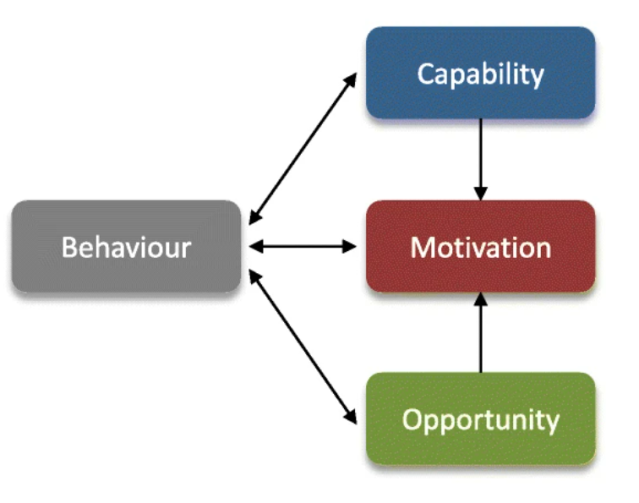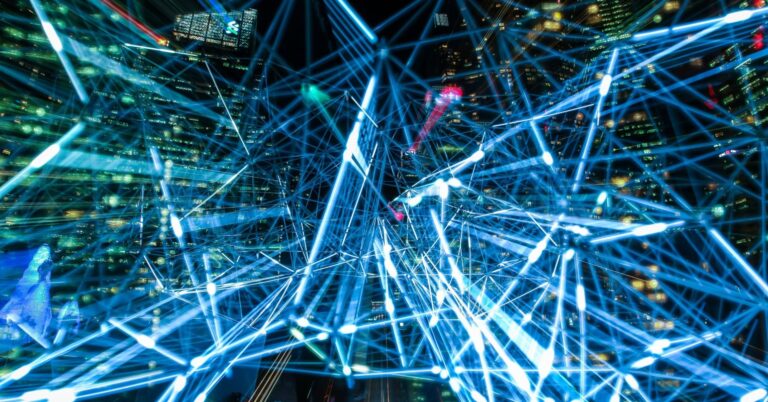Like every new technology, artificial intelligence (AI) creates new opportunities, risks, and uncertainties. However, AI is special—the first technology that can replace and surpass human intelligence rather than just support it, which may make it even more consequential than any technology we have previously developed.
AI is already being used to reshape the way we live and work. But will these changes be positive or negative? To some extent, this depends on if, and how, we use AI to change our behaviour and society. To explain that claim, let’s examine the process of behaviour change, how AI might change it, and some of the implications.
What is the process of behaviour change?
Behaviour change is conceptualised in several ways; COM-B is one of the simple, rigorous and well-researched. It highlights three core drivers of behaviours, our i) capability, ii) motivation, and iii) opportunities.

The COM-B Model for Behavior Change
How does AI influence core drivers of behaviour?
AI can easily be leveraged to affect these drivers of behaviour. Here are three examples.
AI can provide cheap and accessible education that can improve capabilities. AI can enhance human “capability” to do behaviour by offering personalised, adaptable, and affordable education. AI can already provide superior training than some types of traditional education, and in nearly all cases it can provide education that is significantly cheaper and more scalable. This means that millions of people can develop capabilities which they could not otherwise.
AI can provide cheap tailored content that can maximise motivations. AI can understand users at an unprecedented level of scale and sophistication and generate tailored novel content at a much lower cost than was previously possible. As a consequence, it can “motivate” behaviour by communicating what is of most interest to millions of individuals, at optimal moments, and with unprecedented affordability.
AI can time and deliver opportunities, affordably and at scale. Integrated into a vast, invasive, and pervasive modern communication system with access to our data and devices, AI can develop and deploy regular well-timed “opportunities” for behaviour that are more affordable and effective than was previously possible.
Implications
Whether the powerful influence of AI on our behaviours and lives is good or bad depends on how is it used.
If used well, it could significantly improve our productivity, happiness, and health. Visualise this (no doubt incorrect) picture of a future life enabled by AI. You tell your AI assistant that you need to finish a specific project today. It supports and scaffolds the work, gives feedback, and communicates your progress to your team.
That evening, an AI generates a new health-promoting virtual reality game, tailored to your personal need, that you play with friends. While you play, systems powered by AIs restock your pantry, book appointments, and plan tomorrow’s agenda. Throughout, other AIs are working tirelessly to improve medical treatment and drug development and avoid millions of deaths, and hours of despair and suffering. That all sounds pretty good, right?
Unfortunately, we have no reason to expect that the influence of AI will only or mostly be harnessed for good. For instance, terrorists may use AI to develop their capabilities to make weapons, social media networks may use it to drive addiction, and dystopian governments may use it to suppress free thought and action.
AI may also exacerbate many social inequities and problems. As AI begins to do more things that we once paid people to do, what will happen to their income and well-being? Perhaps we can create enough new jobs, or reshape social identities sufficiently to avoid a sense of meaningless. But perhaps not. It is one example of the many risks we should monitor and prepare for.
Artificial Intelligence Essential Reads
The need for more monitoring and research
I have shown how AI can be used to influence our behaviours, and the potential this has to create positive and negative impacts. Whether we get good or bad outcomes will depend, to some extent, on how well we understand this technology and its current and potential effects. The fact that we currently lack much knowledge is therefore greatly concerning.
To address this, psychologists, social scientists, and related professionals should focus on better understanding AI and human-AI interaction. They should explore how AI reasons, performs, and improves; how these capabilities and trends will impact us; and the implications for how to best develop and deploy it. This will be my focus here.


















+ There are no comments
Add yours